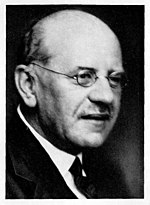Alfred Heuss (musicologist)
Alfred Valentin Heuss (also Heuss ; born January 27, 1877 in Chur ; † July 9, 1934 in Gaschwitz near Leipzig) was a German musicologist , music critic and publisher of music magazines.
Life
After studying music in Stuttgart, Munich and Leipzig, he received his doctorate in 1902 and was editor of the magazine of the international music society from 1904 to 1914, and editor-in- chief of the magazine for music from 1921 to 1929 . As a music critic and writer, Heuss published mainly on early music as well as on classical and romantic music.
He was opposed to contemporary music, which he regarded as “un-German”. Oliver Hilmes has shown how Heuss developed the magazine for music in the Weimar Republic into a bulwark against the avant-garde and everything supposedly 'un-German'. The tendency of the monthly newspaper, particularly evident in the reviews of contemporary works, was not based on a differentiated analysis, but instead led to blanket devaluations and stereotypical prejudices. So-called 'killer phrases' pretend to uncover the causes of complex social crises. In fact, however, the bogus arguments contributed to a dogmatic split into 'good' and 'bad'. Heuss threw himself up to judge about the right to exist of works and their creators. His criticism also referred to conductors like Gustav Brecher . The music ideology in the Nazi state was only the culmination of a development that began long before that.
Heuss' strict national stance went hand in hand with hatred of modernity and pronounced anti-Semitism . An article from 1925 criticized Arnold Schönberg's appointment as head of one of the three master classes for composition at the Prussian Academy of the Arts in Berlin. At the beginning he gave his aesthetic judgment on Schönberg's compositions: “Anyone who knows the situation, whether standing on the right or on the left, knows that the time of Schönberg's hysterical convulsions and fever in music is over, that these are heading for completely different goals and must, because they embodied unnatural simply cannot be taken as a principle in the long run. ”In the next step, Schönberg's appeal turned into a national tragedy:“ The test of its existence that has already been assured today will cost German music at least a few decades, and it will last for a long time to come The source is cloudy because, for the first time in their history, specifically Jewish forces took their development into their hands in a time of inner exhaustion. The self-reliant, nowhere down-to-earth Jew, who also consciously wants to be devoid of tradition, as a fanatical leader - that means nothing other than the path to downfall ”.
Heuss was also active as a composer himself. His sons were the ancient historian Alfred Heuss and the economist Ernst Heuss .
literature
- Alfred Burgartz: Alfred Heuss †. In: The music . Volume 26, 2nd half of the year, August 1934, pp. 845–846 ( archive.org ).
- Gustav Bosse : Dr. Alfred Heuss †. In: magazine for music . Volume 101, 2nd half of 1934, pp. 813–814. ( archive.org ).
- Fritz Stege : A word of farewell to the unforgettable friend Dr. Alfred Heuss. In: New magazine for music | magazine for music. Volume 101, 2nd half of 1934, p. 815 ( Textarchiv - Internet Archive ).
- Hans Schnoor : Alfred Heuss †. In: New magazine for music | magazine for music. Volume 101, 2nd half of 1934, pp. 865–866. ( archive.org ).
- Oliver Hilmes: The dispute about the "German". Alfred Heuss and the magazine for music (= Music City Leipzig. Volume 5). von Bockel, Hamburg 2000, ISBN 3-932696-43-3 .
- Rudolf Stephan: Heuss, Alfred. In: New German Biography (NDB). Volume 9, Duncker & Humblot, Berlin 1972, ISBN 3-428-00190-7 , p. 57 ( digitized version ).
Web links
- Literature by and about Alfred Heuss in the catalog of the German National Library
Individual evidence
- ↑ See Oliver Hilmes, Der Streit ums “Deutsche” , p. 7.
- ↑ Alfred Heuss: Arnold Schönberg - Prussian composition teacher. In: magazine for music . 92. Vol. 10, October 1925, pp. 583-585, here p. 583 ( Textarchiv - Internet Archive ).
- ↑ Heuss, Arnold Schönberg - Prussian composition teacher. P. 584.
| personal data | |
|---|---|
| SURNAME | Heuss, Alfred |
| ALTERNATIVE NAMES | Heuss, Alfred Valentin; Heuss, Alfred |
| BRIEF DESCRIPTION | German musicologist and music critic |
| DATE OF BIRTH | January 27, 1877 |
| PLACE OF BIRTH | Chur |
| DATE OF DEATH | July 9, 1934 |
| Place of death | Gaschwitz near Leipzig |
